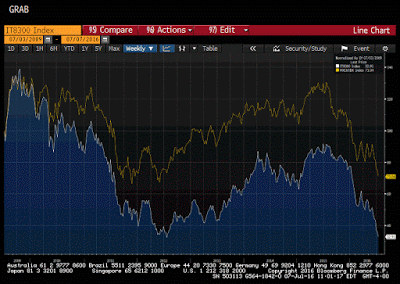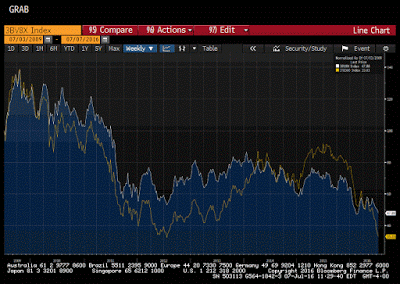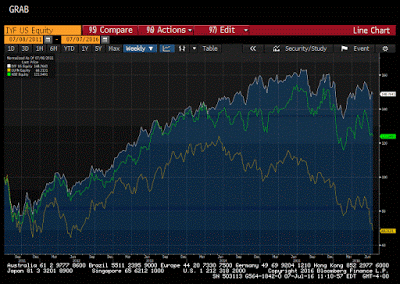
Italian banks were struggling before the UK referendum. The result drove down interest rate, which keeps margins under pressure. The prospects of weaker growth as a result of Brexit means that demand for credit will remain soft. At the same time, the ECB's stress test at the end of the month looms large.
We created three Great Graphics on Bloomberg to help illustrate what is happening in Europe. There are two important divergences to note and one significant convergence.
This first chart show the FTSE Italian bank index (white line) and the MSCI European bank index (yellow line). We indexed both time series to 100 as of 1 July 2009. The Italian bank index has lost two-third of its value over this period. It had staged a recovery from July 2012 through the July 2015. It since sold off, and the index has returned to within striking distance of that 2012 low. The three-year improvement in equity, which partly reflect new capital raising efforts, has been nearly completely reversed.
The MSCI European bank index has fallen nearly half of the decline seen by Italian banks. The index is off 30% since early July 2009. This is the divergence. Looking at only the performance over the past 12 months, we note that the European bank index is nearly 50% lower, while the Italian bank index is 65% lower. The divergence is less over the most recent period, and that is important.
The second chart illustrates why. It shows two time series. Italy's bank index is in yellow, and the German bank index is white. As we have already noted, Italy's bank index has lost roughly 2/3 of its early July 2009 value. The German bank index has fallen 52%.

However, looking at the whole post-Great Financial Crisis period does not do justice to what happened. Consider that from the end of H1 12 through H1 15, Italian banks actually handily outperformed German banks. The Italian bank index had more than doubled (250%), while the German bank index had increased by a little more than 20%.
The third chart here looks at the relative performance of three ETFs. The white line is theiShares US Financials (NYSE:IYF) that tracks the Dow Jones Financial sector. Over the past five years, it has risen 54%. The yellow line is ETF that tracks the iShares MSCI Europe Financials (NASDAQ:EUFN). It has fallen by nearly 30% over the past five years. The green line is the ETF that tracks the SPDR S&P Bank (NYSE:KBE). It has risen by as much as the EUFN has fallen.

The impact from the Brexit decision, leaving aside when Article 50 will be invoked, has been poor for banks. The broader ETF of the US financial sector, IYF, is off about 4%. The more focused US bank ETF, KBE, has lost about 6%. The ETF that tracks European banks has dropped 22%.
The ECB reports the results of its stress tests toward the end of the month. Negotiations between the EC and Italy may drag on until then. New initiatives will be forthcoming. Up until now the reforms have been piecemeal and diluted through compromises. Italy's banks are the latest lightning rod. It is not so much that the attention is unjustified. Rather it is that there appears to be a problem with the European banking system that will continue to fester, even if Italian banks were on more solid footing.
